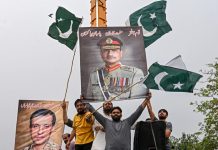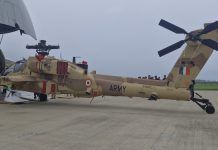In Pakistan-controlled Azad Jammu and Kashmir, the simple fact of the region’s name — with Azad meaning free — is a declaration that Kashmiris here enjoy liberty ‘allegedly’ denied to their kin across the border, in the Jammu and Kashmir.

But even in Pakistan-held Kashmir, the message has been clear, residents say: No talk of independence will be allowed.
As an Indian crackdown on the other side of Kashmir has led to massive civil unrest and new calls for a Kashmir free from either India or Pakistan, local activists and officials say a parallel security operation is being pushed inside Pakistan.
Pakistan has long prided itself on being a champion for Kashmiris, who are predominantly Muslim. And the government has chastised India for suppressing calls for freedom in the portion of Kashmir that New Delhi controls.
But New York Times journalists who were granted rare access to Azad Jammu and Kashmir in recent days found a toughening Pakistani security response to a growing pro-independence movement here.
Is Indian RAW Behind The Disappearance Of Pakistani Colonel – Zahir Habib Who Went Missing In Nepal?
Residents say the upwelling is rooted in fears that their ability to reunify has been slowly slipping away ever since India increased its control of the divided territory and Pakistan did little to stop it other than to offer negotiations that India refused.
The Pakistani crackdown also has another focus, locals say: As outrage over India’s move to end Kashmiri autonomy last month has galvanized militants, Pakistani officials fear they could face international sanctions if they don’t rein in the armed groups.
On both sides of the border, Kashmiris are expressing frustration that no one is on their side.
“Both countries have gone to war over Kashmir. But Kashmiris have never had a voice in any of these disputes,” said Abdul Hakeem Kashmiri, a prominent journalist in Muzaffarabad, the capital of Pakistani-held Kashmir.
Imran Khan Admits Pakistan Will Lose A Conventional War Against Arch-Rival India
“We love the Pakistani Army and the Pakistani people, but we have our own culture. And people know what the unspoken red line is: independence,” Mr. Kashmiri said.
Pro-independence demonstrations that once attracted dozens of protesters are now attracting thousands, residents say. In one case this month, some 5,000 Kashmiris tried to march to the Indian border in Poonch district in Azad Jammu and Kashmir, local police officials said. Protesters charged at Pakistani security officers while chanting, “We want freedom on this side and we want freedom on the other side,” and “Foreign oppressors, leave us alone.”
Police batons cracked into the protesters, halting their advance and leading to scuffles that left 18 demonstrators and seven Pakistani police officers wounded, officials said. The protests were barely covered in Pakistani media, and mobile phone and internet were cut off for awhile in the area. One military general dismissed the demonstrators as “Indian agents.”
Despite appeals from the political leadership of Pakistan-held Kashmir to stop marching to the border area, Kashmiris say they plan to press on. They have called for massive protests on the border with India on Saturday and in early October that are expected to be the biggest demonstrations yet.
“The independence struggle on both sides of the border is being suppressed,” said Anam Zakaria, the author of “Between the Great Divide: A Journey into Pakistan-administered Kashmir.” “There is a frustration that they have been on the front line of the conflict and are pawns in this greater game between India and Pakistan,” she said.
Let Kashmiri People Themselves Wage Jihad To Free Kashmir – Imran Khan
Last month, India stripped the autonomy from the portion of Kashmir it holds and strengthened New Delhi’s hold on the territory, detaining local politicians and activists and imposing a curfew and communications blockade that has entered its second month.
The protests are channeling civilian anger at the “line of control,” the de facto border that splits Kashmir between India and Pakistan, slicing through valleys dotted with wildflowers and pine trees, down the middle of rivers and through entire towns.
Sheep graze over the heavily mined boundary. Shepherds accidentally cross it, oblivious to its contours, only to be shelled by Indian or Pakistani soldiers, or detained.
The line demarcates the point where, in 1947, Indian forces repelled invading Pashtun tribal fighters that Pakistan drew from its border area with Afghanistan — the beginning of a longstanding Pakistani strategy to use militant proxies to weaken its neighboring rivals.
Originally, the line of control was meant to be temporary, with plans for a referendum that would allow Kashmiris to choose whether to join India or Pakistan. That vote never happened, and now, after decades of fighting, many Kashmiris fear that the temporary boundary will become a hard border, dividing the territory permanently.
“Kashmiris are trying to take their fate in their own hands. We realize that we can only rely on ourselves,” said Haris Qadeer, a young Kashmiri who joined the protests and whose newspaper in Muzaffarabad was shut down in 2017 for its pro-independence stance.
“The line of control is what separates us, it is what makes us refugees in our own country,” Mr. Qadeer said.
The police force used against protesters this month was a “preventive measure,” said the president of Azad Jammu and Kashmir, Masood Khan, saying that the police response was restrained compared with that used by Indian forces on the other side of the line, who he said at times open fire on protesters trying to cross the border, resulting in serious injuries.
“There is a high degree of tolerance for dissent. There is an overwhelming pro-Pakistan sentiment in Azad Kashmir and Indian-occupied Kashmir,” Mr. Khan added.
But Kashmiri nationalists are forbidden in government. Elected officials like Mr. Khan must sign a declaration before they can run for office stating that they “believe in the ideology of Pakistan” and in Kashmir’s eventually accession to become a formal part of that country.
Some here say that Pakistan’s response is also rooted in the fear that militants the Pakistani security forces once mobilized to fight India in Kashmir are gearing up again right as Pakistan faces the threat of international sanctions if it does not crack down on terrorist groups.
One former Kashmiri militant said he was angry at what he saw as a hypocritical betrayal by Pakistani officials, who recently shut down the border after pushing various militants to cross it in the 1990s.
The militant, who spoke on condition of anonymity out of fear of reprisal by the authorities, said Pakistan’s military had “polluted” the Kashmiri cause by using the issue as a rallying cry for various terrorist groups in Pakistan to fight India, including Lashkar-e-Taiba, which took part in later attacks against India’s parliament in 2001 and in Mumbai in 2008.
“We were freedom fighters, made up from the Kashmiri people. But then Pakistan pushed groups like Lashkar-e-Taiba on our movement. People began to confuse our struggle for freedom with a desire for terrorism,” the former militant said.
Imran Khan Advised To Avoid Personnel Attacks On PM Modi As MBS Looks To Play Mediator’s Role
Under heavy international pressure to cut links to militants, Pakistan is squeezing the jihadists who once operated freely in Muzaffarabad city, a nerve center for anti-Indian groups, locals say.
In Muzaffarabad, the local office of Hizbul Mujahedeen, a leading faction in the deadly insurgency that wracked Indian-held Kashmir in the 1990s, has been shuttered by officials since May.
“Jihad had once become a way of living,” said Manzoor Gilani, the former chief justice of Azad Jammu and Kashmir.
Now, “not every Tom, Dick and Harry can stand up and say they will go for jihad,” Mr. Gilani added. “The jihadists are now styled as terrorists. They served the interests of Pakistan at one time, but now Pakistan feels it was a bad way of doing business.”
But with India moving unilaterally to finalize its grip on Kashmir, some residents say Pakistan has chosen the worst time to shift gears.
Abdul Rashid Turabi, the former head of Jamaat-e-Islami, believed to be the political arm of the militants Hizbul Mujahedeen, insisted that his group still hoped for peace. “That and dialogue are the priorities,” he said in an interview.
But he added that time was running out for a diplomatic solution to the crisism, and that many here were unwilling to hold back.
“Narendra Modi is driving people to jihad, not me,” he said, referring to India’s prime minister.
Other residents were less restrained.
“The only solution is war,” said Muhammad Arshad Abbasi, a shopkeeper in Chakothi, one of the last border towns before the line of control. “It has been 70 years, and what has talking with India achieved? There is no way other than jihad.”
Via: New York Times




